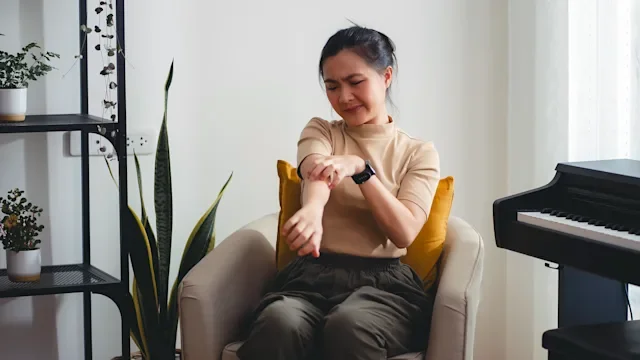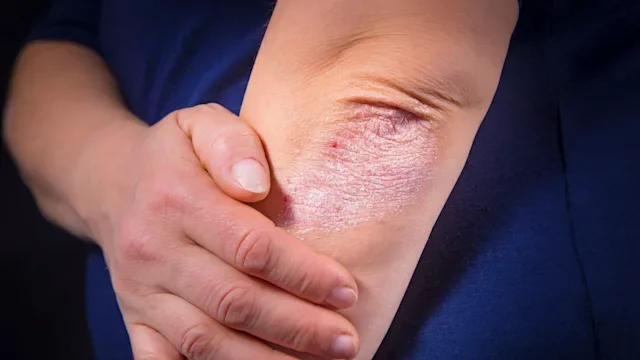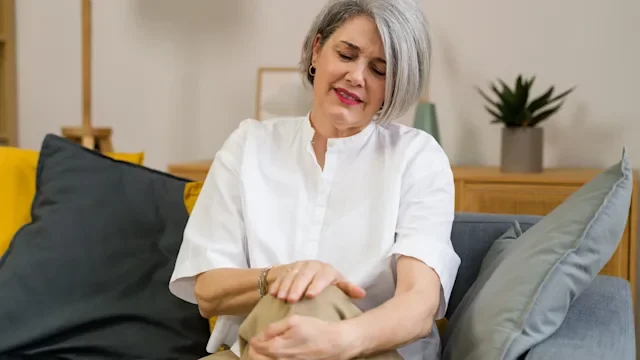Key takeaways:
There are many known triggers that can worsen psoriasis symptoms.
Common psoriasis triggers include certain medications, foods, smoking, and stress.
Learning about what causes psoriasis flare-ups can help you avoid those triggers in the future.
Avoiding your triggers can help prevent psoriasis flares. But sometimes people need prescription psoriasis treatments.
Psoriasis is a chronic autoimmune skin disease that affects about 3% of people in the U.S. It affects each person differently, but there are common triggers that are more likely to worsen psoriasis. Knowing about these psoriasis triggers — and those that may specifically affect you — can help you avoid them in the future. Keep in mind that each person is unique, and what may be a trigger for one person may not be for someone else.
1. Medications
Some prescription and over-the-counter (OTC) medications can worsen psoriasis. Some can even cause you to develop psoriasis when you’ve never had it before. It’s not clear exactly why this happens.
Common medications that can cause psoriasis flare-ups include:
Beta blockers: Beta blockers treat conditions like high blood pressure and heart failure. Examples include metoprolol (Lopressor) and propranolol (Inderal).
Lithium (Eskalith): Lithium is used to treat bipolar disorder and depression.
Antimalarial medications: In addition to treating malaria, these are also used to treat some autoimmune disorders, like lupus and rheumatoid arthritis. Hydroxychloroquine (Plaquenil) is one example.
Nonsteroidal anti-inflammatory drugs (NSAIDs): NSAIDs are used to treat all sorts of conditions, like menstrual cramps and headaches. Naproxen (Naprosyn) is one example.
Keep in mind that this isn’t the whole list. There may be other medications that trigger your psoriasis symptoms. Talk with a healthcare professional if you think one of your medications could be worsening your psoriasis.
2. Foods
Specific foods can trigger symptoms for some people with psoriasis. Keeping track of your psoriasis symptoms and the different foods you eat can help you identify possible triggers.
Here are some common food triggers for people with psoriasis:
3. Smoking
There’s strong evidence that smoking cigarettes worsens psoriasis. And smoking may also make your psoriasis treatment less effective. If you have psoriasis, quitting smoking can improve your skin and your overall health. You’ll experience fewer psoriasis flares and spend more time in remission, with little or no psoriasis.
Plus, stopping smoking will lower your risk of heart and autoimmune diseases.
4. Alcohol
For many people, drinking alcohol can be a big trigger for psoriasis symptoms. Again, it’s not clear exactly why this is. You don’t have to drink excessively either. Just drinking more than 2 drinks a day (for men) or more than 1 drink a day (for women) can cause psoriasis symptoms to flare.
Your diet and psoriasis: From sugar to alcohol, learn what foods may be triggering your psoriasis — and what to eat instead.
Living with psoriasis: Read how one woman with psoriasis managed her physical and mental health, and made self-care a priority.
Psoriasis from head to toe: See what psoriasis looks like on different parts of the body (with pictures).
Limiting or cutting out alcohol has many benefits to your health, and even more if you have psoriasis. It can help you:
Avoid psoriasis flares
Increase the time you spend with little or no psoriasis symptoms (remission)
Lower your risk of developing fatty liver disease and liver-related side effects from psoriasis medications.
Lower the risk of developing psoriatic arthritis (for women).
5. Stress
Stress is a common psoriasis trigger — but it can be hard to avoid. When psoriasis flares, it can lead to more stress, which starts a cycle that’s hard to get out of. Finding ways to manage your stress can help.
- PrednisoneGeneric Deltasone and Rayos and Sterapred
- MedrolMethylprednisolone
- Fluticasone PropionateGeneric Cutivate and Flonase
Beyond medication, here are some life strategies that are proven to help lower stress:
6. Infections
Certain infections can trigger or worsen psoriasis symptoms. Strep throat is a throat infection caused by Streptococcus bacteria. It’s a common trigger for guttate psoriasis, a less common type of psoriasis that usually affects children and young adults.
Other infections that can trigger different types of psoriasis include:
Sinus infections
Human immunodeficiency virus (HIV)
When an infection causes a psoriasis flare, treating the infection can sometimes improve the psoriasis. But it’s usually not enough to clear the psoriasis completely. Those affected often need additional psoriasis treatment.
7. Injuries to the skin
If you have psoriasis, injuring your healthy skin can trigger psoriasis in that area, even if you didn’t have it there before. This is called the Koebner phenomenon. It’s not clear why it happens, but it affects about 1 in 4 people who have psoriasis. Any skin injury can cause this, but some common ones include:
When this happens, psoriasis usually improves with usual treatments. But it’s important to avoid future skin injuries as much as possible.
8. Weather
For some people, the colder winter months can also cause psoriasis to flare. There are a few different reasons for this:
People spend less time outside, so they have less exposure to sunlight (which normally improves psoriasis).
Indoor air, which is heated and dry, and decreased humidity outside can dry out and irritate the skin.
There are more illnesses in winter months (like colds and the flu), which can trigger psoriasis.
If you have psoriasis, it’s important to keep your skin moisturized and protected to minimize the chance of a flare.
9. Obesity
Health comes in different shapes and sizes, and being healthy in a larger body is definitely possible. But carrying a lot of extra weight can increase your risk of having psoriasis and make pre-existing psoriasis worse. This is because extra weight is linked to chronic inflammation, which can trigger psoriasis. It can also make some psoriasis medications less effective,
If you have overweight or obesity, losing weight — even a small amount, like 5% of your weight — can improve your psoriasis.
10. Hormones
Changes in certain hormone levels (like estrogen levels) can also trigger or improve psoriasis.
For example, some women experience improved psoriasis during pregnancy, when estrogen levels are high. This may be because estrogen can affect both the immune system and the skin barrier. But, when estrogen levels fall, this may trigger a psoriasis flare. This can happen during a few different times in a woman’s life, including:
Postpartum
How to avoid psoriasis triggers
The first step for avoiding triggers is to know what they are. This can be hard, especially since psoriasis affects each person differently and triggers are different for everyone. Keeping a daily journal of your psoriasis symptoms and how they relate to other parts of your day (like your medications or diet) can help you start to figure it out.
You likely can’t avoid every psoriasis trigger, but here are some tips and strategies to help you avoid some common culprits:
Cut back or cut out alcohol.
Stop smoking, if you smoke.
Avoid common dietary triggers (like added sugar).
Get vaccinated, wear a mask, and wash your hands if you’re around people who are sick.
Keep your skin hydrated and protected to lower your risk of injury.
Manage stress levels with meditation and other techniques.
If you think a medication is triggering your psoriasis, talk with a healthcare professional before making any changes to your treatment for other conditions.
How do you calm a psoriasis flare-up?
The first step in calming a psoriasis flare is to cut out any known triggers. Sometimes, just doing this is enough to calm psoriasis symptoms.
In other situations, you may need to treat the psoriasis flare to lessen your symptoms. This may include a short course of prescription medication, like topical steroids. If your flare is significant or isn’t clearing up, talk with a healthcare professional to see what your other options are.
Frequently asked questions
Psoriasis on the scalp can cause hair loss. But this hair loss is usually temporary, and hair eventually grows back after the psoriasis is treated. Here are some tips to prevent hair loss if you have scalp psoriasis:
Avoid scratching or picking your psoriasis.
Skip the hair dryer and let your hair air dry.
Use your psoriasis treatments as prescribed.
Experts don’t know the exact cause of psoriasis, but it’s likely a combination of different factors, including your genes and environmental exposures. Once you have psoriasis, it causes the skin cells to grow too fast. If you have scalp psoriasis (or psoriasis anywhere else), avoiding triggers and sticking to a good treatment plan are the best ways to keep symptoms under control.
No, psoriasis is never contagious. Psoriasis isn’t caused by an infection, and you can’t catch it from touching or being around someone who has it.
Psoriasis on the scalp can cause hair loss. But this hair loss is usually temporary, and hair eventually grows back after the psoriasis is treated. Here are some tips to prevent hair loss if you have scalp psoriasis:
Avoid scratching or picking your psoriasis.
Skip the hair dryer and let your hair air dry.
Use your psoriasis treatments as prescribed.
Experts don’t know the exact cause of psoriasis, but it’s likely a combination of different factors, including your genes and environmental exposures. Once you have psoriasis, it causes the skin cells to grow too fast. If you have scalp psoriasis (or psoriasis anywhere else), avoiding triggers and sticking to a good treatment plan are the best ways to keep symptoms under control.
No, psoriasis is never contagious. Psoriasis isn’t caused by an infection, and you can’t catch it from touching or being around someone who has it.
The bottom line
There are many known triggers that can make psoriasis worse. Knowing — and avoiding — these psoriasis triggers can help you keep your symptoms under control. Common triggers include stress, smoking, and certain medications, like nonsteroidal anti-inflammatory drugs (NSAIDs). Psoriasis affects each person differently. So, it’s important to identify your own triggers and make a plan for how to avoid these in the future. This will help keep your skin clear and psoriasis symptoms at bay.

Why trust our experts?


References
Afifi, L., et al. (2017). Dietary behaviors in psoriasis: Patient-reported outcomes from a U.S. national survey. Dermatology and Therapy.
American Academy of Dermatology Association. (n.d.). Are triggers causing your psoriasis flare-ups?
American Academy of Dermatology Association. (n.d.). Healthy diet and other lifestyle changes that can improve psoriasis.
American Academy of Dermatology Association. (n.d.). Scalp psoriasis: 10 ways to reduce hair loss.
Balak, D. M. W., et al. (2017). Drug-induced psoriasis: Clinical perspectives. Psoriasis.
Cassalia, F., et al. (2025). How hormonal balance changes lives in women with psoriasis. Journal of Clinical Medicine.
Dupire, G., et al. (2019). Does treating streptococcal throat infection help improve psoriasis? The Cochrane Database of Systematic Reviews.
Elmets, C. A., et al. (2019). Joint AAD-NPF guidelines of care for the management and treatment of psoriasis with awareness and attention to comorbidities. Journal of the American Academy of Dermatology.
Fordyce, K. (2025). It’s not you, it’s the inflammation. National Psoriasis Foundation.
Ji, Y., et al. (2019). Koebner phenomenon leading to the formation of new psoriatic lesions: Evidences and mechanisms. Bioscience Reports.
Ludmann, P. (2020). What should I eat if I have psoriasis? American Academy of Dermatology Association.
Luo, A. (2014). Koebner phenomenon. DermNet.
Marsh, J. (2011). Tips for keeping a gratitude journal. Greater Good Magazine.
Naldi, L. (2016). Psoriasis and smoking: Links and risks. Psoriasis.
National Psoriasis Foundation. (2025). Causes and triggers.
National Psoriasis Foundation. (2025). Guttate psoriasis.
Paroutoglou, K., et al. (2020). Deciphering the association between psoriasis and obesity: Current evidence and treatment considerations. Current Obesity Reports.
Perricone, C., et al. (2016). Smoke and autoimmunity: The fire behind the disease. Autoimmunity Reviews.
Schlosser, S. (2021). Psoriasis in women. National Psoriasis Foundation.
Zhou, H., et al. (2020). Impact of smoking on psoriasis risk and treatment efficacy: A meta-analysis. Journal of International Medical Research.














